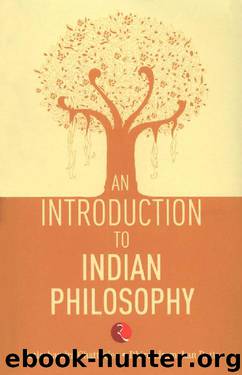An Introduction to Indian Philosophy by Satishchandra Chatterjee & Dhirendramohan Datta

Author:Satishchandra Chatterjee & Dhirendramohan Datta [Chatterjee, Satishchandra]
Language: eng
Format: epub
Tags: Mobilism
Publisher: Rupa Publications
Published: 2012-12-01T18:30:00+00:00
VI. CONCLUSION
The value of the Nyāya system lies especially in its methodology or theory of knowledge on which it builds its philosophy. One of the charges against Indian philosophy is that it is based on religious authority and is, therefore, dogmatic and not critical. The Nyāya philosophy is a standing repudiation of this charge. The theory of knowledge, formulated by the Nyāya, is made the basis not only on the Nyāya-Vaiśeṣika, but also of other Indian systems, with slight modifications. The Nyāya applies the method of logical criticism to solve the problems of life and reality. It is by means of a sound logic that it tries to find out the truth and defend it against hostile criticism. But the Nyāya theory of pluralistic realism is not as satisfying as its logic. Here we have a common-sense view of the world as a system of many independent realities, like material atoms, minds, individual souls and God, which are externally related to one another in space, time and ākāśa. It does not give us a systematic philosophy of the world as a whole in the light of one universal absolute principle. The philosophical position of the Nyāya is said to be lower than that of the Sāṅkhya or the Vedānta. This becomes mainfest when we consider its theory of the individual self and God. According to it, the individual self is a substance which is not essentially conscious and intelligent, but is accidentally qualified by consciousness when associated with a body. But such a view of the self is contradicted by the evidence of our direct experience which reveals the self as an essentially conscious subject and not as a thing with the quality of consciousness. Further, on this view, the liberated self has no consciousness and is, therefore, indistinguishable from a material substance. The Nyāya conception of God as the architect of the world, its efficient but not material cause, has an obvious reference to human analogy and reduces God to the position of a human artificer who makes things out of the given material. There is indeed the suggestion that the world of things and beings is related to God as one's body is to one's self. But this idea is not properly developed in the direction of a full-fledged theism. Still, as a philosophy of life, the Nyāya theism is no less edifying and assuring than other forms of it.
Download
This site does not store any files on its server. We only index and link to content provided by other sites. Please contact the content providers to delete copyright contents if any and email us, we'll remove relevant links or contents immediately.
| Anthropology | Archaeology |
| Philosophy | Politics & Government |
| Social Sciences | Sociology |
| Women's Studies |
Hindu Myths (Penguin Classics) by Doniger Wendy(695)
The Complete Kama Sutra by Alain Danielou(640)
Eastern Body, Western Mind by Judith Anodea(557)
The Mahabharata of Krishna-Dwaipayana Vyasa (Complete 18 Volumes) by Kisari Mohan Ganguli(556)
Hindu Philosophy by Theos Bernard(551)
The Ramcharitmanas 3 by Tulsidas(549)
Eastern Body, Western Mind: Psychology and the Chakra System as a Path to the Self by Judith Anodea(542)
The Ramcharitmanas 1 by Tulsidas(536)
India by Diana L Eck(535)
The Ramcharitmanas 2 by Tulsidas(503)
The Dharmasutras: The Law Codes of Ancient India (Oxford World's Classics) by Patrick Olivelle(500)
The Complete Works of Swami Vivekananda by Swami Vivekananda(474)
Songs of Kabir by Kabir(458)
The Bhagavad Gita According to Gandhi by Mahatma Gandhi(415)
Eastern Body, Western Mind: Psychology and the Chakra System As a Path to the Self by Judith Anodea(413)
Krishnamurti's Journal by Jiddu Krishnamurti(364)
The First Sikh by Nikky-Guninder Kaur Singh(360)
Conscious Confidence by Sarah Mane(353)
The Essence Of The Ashtavakra Gita by Ramesh S Balsekar(348)
